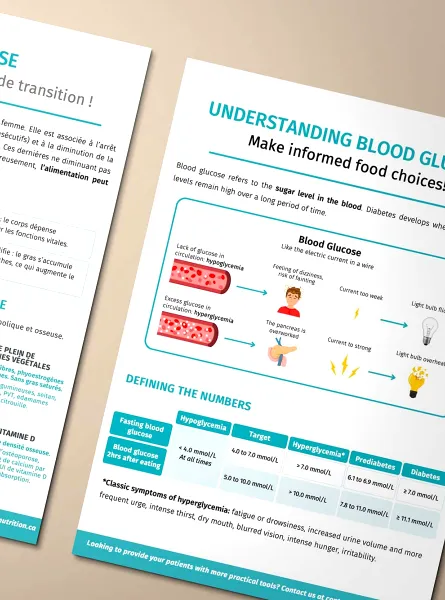
What is Nutrigenomics?
Nutrigenomics is a discipline that applies the principles of genomics, the study of an individual's entire genome to understand their specific traits, to nutrition (1). The method used is Genome-Wide Association Study (GWAS). This approach essentially involves comparing the complete genetic profile of a population with a common trait to that of a non-affected population to highlight significant genetic differences between these two groups (2). This comparison is based on Single Nucleotide Polymorphisms (SNPs), which are variations of a single base pair in the genome. To be considered an SNP, this variation must be present in more than 1% of the population and located at a specific location in the genome (3). Thus, GWAS allows for identifying SNPs associated with a trait. Through GWAS, it is possible to assemble the significant SNPs into a Genetic Risk Score (GRS) to understand the contributory effect of different associated SNPs (1).
The use of nutrigenomics has several advantages for healthcare professionals. It has been noted in the literature that there is significant interindividual variability in response to nutritional treatment (4). Nutrigenomics thus enables us to predict the metabolic response to a nutritional intervention and estimate the nutritional needs of a group of individuals more accurately (1).
Recent Findings
The impact of omega-3 supplementation on triglyceride (Tg) variation has been studied. It has been observed that the variation in Tg response to omega-3 supplementation can, among other factors, be explained by DNA methylation, which affects the expression levels of certain genes such as IQCJ, NXPH1, PHF17, and MYB, as identified by GWAS (5). Based on this data, a study calculated a GRS that explained 49.73% of the variance in Tg response (6). On the other hand, certain genes such as CYP1A2 and potentially ADORA2 have been associated with caffeine response. SNPs can affect the activity of the enzyme CYP1A2, responsible for caffeine metabolism. They can thus identify individuals who metabolize caffeine more slowly and are at higher risk of developing hypertension, cardiovascular diseases, and prediabetes (7). Moreover, individuals who metabolize caffeine rapidly not only have a lower risk of developing these health problems but can also benefit from caffeine supplementation for certain sports activities such as cycling (7).
Nutrigenomics can also be useful in the context of anemia, particularly in athletes, as certain genetic variations can alter the absorption, transport, and metabolism of certain micronutrients (7). For example, the C677T polymorphism of the MTHFR gene, which encodes for the enzyme methylenetetrahydrofolate reductase, the limiting enzyme in the methyl cycle, is associated with lower circulating and red blood cell folate levels and elevated homocysteine levels (7). Similarly, three SNPs (TMPRSS6, TFR2, and TF) may be associated with low iron reserves due to their involvement in the regulation of the hormone that controls iron absorption, hepcidin (7). Similarly, two genes (GC and CYP2R1) are associated with a higher risk of vitamin D deficiency (8). According to a study, supplementation explains 18% of the variation in plasma vitamin D levels, compared to 30% for genetics (8).
Another potential use of nutrigenomics lies in the distribution of macronutrients in the diet and body composition. For instance, the FTO gene is known in the literature for its impact on weight management and body composition (7). Thus, according to a multicenter study, the presence of a mutated allele on the FTO gene would be associated with a decrease in body fat following a high-protein diet over a period of 2 years, compared to individuals carrying a major allele (9). Variable results are also observed depending on genetic variation for diets rich or poor in fat: participants carrying two copies of the mutated allele on the TCF7L2 gene lost more body fat with a low-fat diet (20-25% of total energy), compared to a high-fat diet (40-45% of total energy), while no difference was observed between the two diets for those carrying two major alleles (10). In another study, participants with two major alleles would lose more lean mass, suggesting that these individuals would not have the same benefits from a low-fat diet as those carrying two copies of the mutated allele (11).
Ethical Issues
Over-the-counter availability of genetic tests without the involvement of healthcare professionals raises several important ethical issues. Patients who have access to these tests may not necessarily have the skills or literacy necessary to interpret the complexity of the results correctly, making informed consent difficult to obtain (1). However, it is important to mention that some companies require the disclosure of results by nutritionists, which limits these types of issues. The confidentiality of genetic information is also a major concern, especially regarding the ownership of results, protection of information, and conservation of biological material (12). Another challenge lies in the reliability of tests and the availability of solid evidence to interpret the results. Many companies offer genetic tests based on a single SNP or a small amount of information, explaining a low proportion of the studied diseases and raising concerns about the accuracy and relevance of the obtained results (13). Some authors argue, however, that certain genetic variations have a significant impact on the risk of chronic diseases (14). Furthermore, it should be noted that most genetic tests are generally constructed based on Caucasian populations, which limits their generalization to other ethnic groups and increases social inequalities in health (15). Finally, there is a risk of discrimination by insurance companies, which could use genetic results to make discriminatory decisions regarding coverage and insurance premiums (16). These ethical issues highlight the need to appropriately regulate the sale and use of genetic tests to ensure the protection of patients' rights and avoid potentially harmful consequences.
Despite these limitations and challenges, nutrigenomics technology continues to develop, carrying with it the promise of completely individualizing nutritional recommendations.
Personalized recommendations are a key element in nutritional treatment to ensure long-term adherence. A nutritionist from TeamNutrition will be able to provide your clients with personalized advice that matches their dietary habits, lifestyle, and family situation. Contact us to learn more about our services!
Special thanks to Dr. Bastien Vallée Marcotte Ph.D. for his contribution to this article.
References:
Vallée Marcotte, B. (2021). Approche intégrée de la nutrigénomique : de l’identification de marqueurs génétiques aux applications cliniques. Corpus. https://corpus.ulaval.ca/entities/publication/cc4cc2af-20cf-41b1-babe-482b7bb8e7af
Marees, A. T., de Kluiver, H., Stringer, S., Vorspan, F., Curis, E., Marie-Claire, C., & Derks, E. M. (2018). A tutorial on conducting genome-wide association studies: Quality control and statistical analysis. International journal of methods in psychiatric research, 27(2), e1608. https://doi.org/10.1002/mpr.1608
Cotton CM & Murray JC. (2018). 17 - The Human Genome and Neonatal Care dans Gleason C.A. et Jull S.E. (dir.), Avery's Diseases of the Newborn (10 Ed., p.180-189.e2) https://doi.org/10.1016/B978-0-323-40139-5.00017-6
Zeisel S. H. (2020). Precision (Personalized) Nutrition: Understanding Metabolic Heterogeneity. Annual review of food science and technology, 11, 71–92. https://doi.org/10.1146/annurev-food-032519-051736
Vallée Marcotte, B., Guénard, F., Cormier, H., Lemieux, S., Couture, P., Rudkowska, I., & Vohl, M. C. (2017). Plasma Triglyceride Levels May Be Modulated by Gene Expression of IQCJ, NXPH1, PHF17 and MYB in Humans. International journal of molecular sciences, 18(2), 257. https://doi.org/10.3390/ijms18020257
Vallée Marcotte, B., Guénard, F., Lemieux, S., Couture, P., Rudkowska, I., Calder, P. C., Minihane, A. M., & Vohl, M. C. (2019). Fine mapping of genome-wide association study signals to identify genetic markers of the plasma triglyceride response to an omega-3 fatty acid supplementation. The American journal of clinical nutrition, 109(1), 176–185. https://doi.org/10.1093/ajcn/nqy298
Guest, N. S., Horne, J., Vanderhout, S. M., & El-Sohemy, A. (2019). Sport Nutrigenomics: Personalized Nutrition for Athletic Performance. Frontiers in nutrition, 6, 8. https://doi.org/10.3389/fnut.2019.00008
Slater, N. A., Rager, M. L., Havrda, D. E., & Harralson, A. F. (2017). Genetic Variation in CYP2R1 and GC Genes Associated With Vitamin D Deficiency Status. Journal of pharmacy practice, 30(1), 31–36. https://doi.org/10.1177/0897190015585876
Zhang, X., Qi, Q., Zhang, C., Smith, S. R., Hu, F. B., Sacks, F. M., Bray, G. A., & Qi, L. (2012). FTO genotype and 2-year change in body composition and fat distribution in response to weight-loss diets: the POUNDS LOST Trial. Diabetes, 61(11), 3005–3011. https://doi.org/10.2337/db11-1799
Grau, K., Cauchi, S., Holst, C., Astrup, A., Martinez, J. A., Saris, W. H., Blaak, E. E., Oppert, J. M., Arner, P., Rössner, S., Macdonald, I. A., Klimcakova, E., Langin, D., Pedersen, O., Froguel, P., & Sørensen, T. I. (2010). TCF7L2 rs7903146-macronutrient interaction in obese individuals' responses to a 10-wk randomized hypoenergetic diet. The American journal of clinical nutrition, 91(2), 472–479. https://doi.org/10.3945/ajcn.2009.27947
Mattei, J., Qi, Q., Hu, F. B., Sacks, F. M., & Qi, L. (2012). TCF7L2 genetic variants modulate the effect of dietary fat intake on changes in body composition during a weight-loss intervention. The American journal of clinical nutrition, 96(5), 1129–1136. https://doi.org/10.3945/ajcn.112.038125
Commissariat à la protection de la vie privée du Canada. (décembre 2017). Tests génétiques offerts directement aux consommateurs et protection de la vie privée. https://www.priv.gc.ca/fr/sujets-lies-a-la-protection-de-la-vie-privee/renseignements-sur-la-sante-renseignements-genetiques-et-autres-renseignements-sur-le-corps/02_05_d_69_gen/
Loos R. J. F. (2019). From nutrigenomics to personalizing diets: are we ready for precision medicine?. The American journal of clinical nutrition, 109(1), 1–2. https://doi.org/10.1093/ajcn/nqy364
Garcia-Bailo, B., & El-Sohemy, A. (2021). Recent advances and current controversies in genetic testing for personalized nutrition. Current opinion in clinical nutrition and metabolic care, 24(4), 289–295. https://doi.org/10.1097/MCO.0000000000000763
Martin, A. R., Kanai, M., Kamatani, Y., Okada, Y., Neale, B. M., & Daly, M. J. (2019). Clinical use of current polygenic risk scores may exacerbate health disparities. Nature genetics, 51(4), 584–591. https://doi.org/10.1038/s41588-019-0379-x
Horne, J., Gilliland, J., Madill, J., & Shelley, J. (2020). A critical examination of legal and ethical considerations for nutrigenetic testing with recommendations for improving regulation in Canada: from science to consumer. Journal of law and the biosciences, 7(1), lsaa003. https://doi.org/10.1093/jlb/lsaa003





